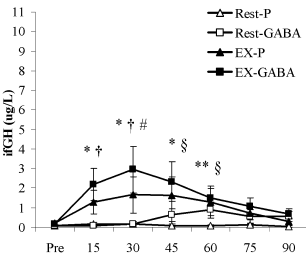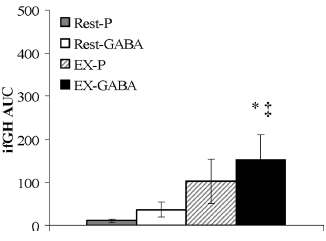GABA quadruples release of growth hormone after training
Posted: Sun May 31, 2020 4:12 pm
This is why I use gaba before bed,, the stuff is amazing!

GABA quadruples release of growth hormone after training (Med Sci Sports Exerc. 2008 Jan; 40 (1): 104-10.)
Growth hormone isoform responses to GABA ingestion at rest and after exercise.
Powers ME1, Yarrow JF, McCoy SC, Borst SE.
Author information
1Division of Athletic Training, Shenendoah University, Winchester, VA 22601, USA. [email protected]
Abstract
Oral administration of the amino acid/inhibitory neurotransmitter gamma aminobutyric acid (GABA) reportedly elevates resting serum growth hormone (GH) concentrations.
PURPOSE:
To test the hypothesis that GABA ingestion stimulates immunoreactive GH (irGH) and immunofunctional GH (ifGH) release at rest and that GABA augments the resistance exercise-induced irGH/ifGH responses.
METHODS:
Eleven resistance-trained men (18-30 yr) participated in this randomized, double-blind, placebo-controlled, crossover study. During each experimental bout, participants ingested either 3 g of GABA or sucrose placebo (P), followed either by resting or resistance exercise sessions. Fasting venous blood samples were acquired immediately before and at 15, 30, 45, 60, 75, and 90 min after GABA or P ingestion and were assayed for irGH and ifGH.
RESULTS:
At rest, GABA ingestion elevated both irGH and ifGH compared with placebo. Specifically, peak concentrations of both hormones were elevated by about 400%, and the area under the curve (AUC) was elevated by about 375% (P < 0.05). Resistance exercise (EX-P) elevated time-point (15-60 min) irGH and ifGH concentrations compared with rest (P < 0.05). The combination of GABA and resistance exercise (EX-GABA) also elevated the peak, AUC, and the 15- to 60-min time-point irGH and ifGH responses compared with resting conditions (P < 0.05). Additionally, 200% greater irGH (P < 0.01) and 175% greater ifGH (P < 0.05) concentrations were observed in the EX-GABA than in the EX-P condition, 30 min after ingestion. GABA ingestion did not alter the irGH to ifGH ratio, and, under all conditions, ifGH represented approximately 50% of irGH.
CONCLUSIONS:
Our data indicate that ingested GABA elevates resting and postexercise irGH and ifGH concentrations. The extent to which irGH/ifGH secretion contributes to skeletal muscle hypertrophy is unknown, although augmenting the postexercise irGH/ifGH response may improve resistance training-induced muscular adaptations.
Strength athletes who take 3 grams of the GABA supplement [structural formula below] thereby quadruple their release of growth hormone during and after training. Sports scientists at Shenendoah University discovered this through a test on 11 men of 23 years on average, who were already training with weights before the test started.
GABA - in full: gamma-aminobutyric acid - is a neurotransmitter that you mainly find in the brain. The body makes the connection from glutamate. GABA plays a role in relaxation. Sedatives and sleeping agents such as benzodiazepines and barbiturates work via the same receptor as GABA. GABA is on the market as a supplement, but you have to take quite a lot of GABA to notice it. The brain has difficulty absorbing GABA from the blood.
GABA stimulates the release of growth hormone by the brain. Strength training does that too. The researchers wondered what would happen if you did both. Will the release of growth hormone increase even more?
The researchers got their test subjects to train the main muscle groups in their body with chest-press, lat-pulldown, flies, seated-row, shoulder-press, biceps-curl, triceps-extension, leg-press, leg-curl, leg- extension and the calf raise. The subjects trained with 70 percent of the weight with which they could just make 1 rep, did 1 set of each exercise and rested for 1 minute between sets. The training lasted fifteen minutes.
On one occasion the subjects took 4 caps of GABA-750 [with 750 mg GABA in each cap] just before they started training, the other time caps without active substance. The researchers repeated the procedure while the subjects were resting. Even if the men do not train, the GABA supplement increased their GH level.

The figure above relates to immunoreactive GH. That is the fraction of the growth hormone that is biologically active.
The researchers monitored the blood of the test subjects for an hour and a half. Below you can see how many active GH the test subjects created during that period in total.

GABA increases the total amount of growth hormone that the subjects created during their training by 480 percent. The researchers do not know whether strength athletes will lose fat or build up more muscle tissue faster in the longer term.

GABA quadruples release of growth hormone after training (Med Sci Sports Exerc. 2008 Jan; 40 (1): 104-10.)
Growth hormone isoform responses to GABA ingestion at rest and after exercise.
Powers ME1, Yarrow JF, McCoy SC, Borst SE.
Author information
1Division of Athletic Training, Shenendoah University, Winchester, VA 22601, USA. [email protected]
Abstract
Oral administration of the amino acid/inhibitory neurotransmitter gamma aminobutyric acid (GABA) reportedly elevates resting serum growth hormone (GH) concentrations.
PURPOSE:
To test the hypothesis that GABA ingestion stimulates immunoreactive GH (irGH) and immunofunctional GH (ifGH) release at rest and that GABA augments the resistance exercise-induced irGH/ifGH responses.
METHODS:
Eleven resistance-trained men (18-30 yr) participated in this randomized, double-blind, placebo-controlled, crossover study. During each experimental bout, participants ingested either 3 g of GABA or sucrose placebo (P), followed either by resting or resistance exercise sessions. Fasting venous blood samples were acquired immediately before and at 15, 30, 45, 60, 75, and 90 min after GABA or P ingestion and were assayed for irGH and ifGH.
RESULTS:
At rest, GABA ingestion elevated both irGH and ifGH compared with placebo. Specifically, peak concentrations of both hormones were elevated by about 400%, and the area under the curve (AUC) was elevated by about 375% (P < 0.05). Resistance exercise (EX-P) elevated time-point (15-60 min) irGH and ifGH concentrations compared with rest (P < 0.05). The combination of GABA and resistance exercise (EX-GABA) also elevated the peak, AUC, and the 15- to 60-min time-point irGH and ifGH responses compared with resting conditions (P < 0.05). Additionally, 200% greater irGH (P < 0.01) and 175% greater ifGH (P < 0.05) concentrations were observed in the EX-GABA than in the EX-P condition, 30 min after ingestion. GABA ingestion did not alter the irGH to ifGH ratio, and, under all conditions, ifGH represented approximately 50% of irGH.
CONCLUSIONS:
Our data indicate that ingested GABA elevates resting and postexercise irGH and ifGH concentrations. The extent to which irGH/ifGH secretion contributes to skeletal muscle hypertrophy is unknown, although augmenting the postexercise irGH/ifGH response may improve resistance training-induced muscular adaptations.
Strength athletes who take 3 grams of the GABA supplement [structural formula below] thereby quadruple their release of growth hormone during and after training. Sports scientists at Shenendoah University discovered this through a test on 11 men of 23 years on average, who were already training with weights before the test started.
GABA - in full: gamma-aminobutyric acid - is a neurotransmitter that you mainly find in the brain. The body makes the connection from glutamate. GABA plays a role in relaxation. Sedatives and sleeping agents such as benzodiazepines and barbiturates work via the same receptor as GABA. GABA is on the market as a supplement, but you have to take quite a lot of GABA to notice it. The brain has difficulty absorbing GABA from the blood.
GABA stimulates the release of growth hormone by the brain. Strength training does that too. The researchers wondered what would happen if you did both. Will the release of growth hormone increase even more?
The researchers got their test subjects to train the main muscle groups in their body with chest-press, lat-pulldown, flies, seated-row, shoulder-press, biceps-curl, triceps-extension, leg-press, leg-curl, leg- extension and the calf raise. The subjects trained with 70 percent of the weight with which they could just make 1 rep, did 1 set of each exercise and rested for 1 minute between sets. The training lasted fifteen minutes.
On one occasion the subjects took 4 caps of GABA-750 [with 750 mg GABA in each cap] just before they started training, the other time caps without active substance. The researchers repeated the procedure while the subjects were resting. Even if the men do not train, the GABA supplement increased their GH level.

The figure above relates to immunoreactive GH. That is the fraction of the growth hormone that is biologically active.
The researchers monitored the blood of the test subjects for an hour and a half. Below you can see how many active GH the test subjects created during that period in total.

GABA increases the total amount of growth hormone that the subjects created during their training by 480 percent. The researchers do not know whether strength athletes will lose fat or build up more muscle tissue faster in the longer term.